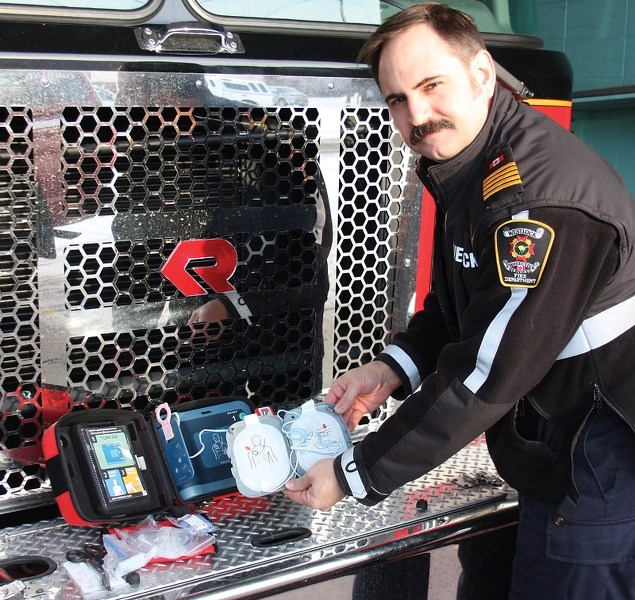You might have walked past one hundreds of times without taking any notice of it — but one Westlock man will never take it for granted again.
While playing pickle ball at the Westlock Rotary Spirit Centre on Jan. 29 the man, who asked not to be identified, collapsed due to heart troubles. Fortunately, there are several Automatic External Defibrillators (AEDs) on site.
“It certainly saved this fellow’s life,” said retired Dr. Alan Watt, who performed CPR with the help of bystanders before administering shocks with the AED. “This thing very definitely saved a life here, without a doubt.”
Watt is no longer a registered physician; he’s been retired since 2001, and described himself as more of a “layman” when it comes to using an AED. Fortunately, he said, these machines are designed in such a way that anybody can use them.
“You don’t need any skill whatsoever, you just need to be able to take it apart. In fact, once you get it open and get it turned on, it speaks to you,” he said. “The machine tells you what to do.”
What really made the difference was that somebody knew this machine was in the Spirit Centre, and had brought it to the first-aid providers within about three minutes of the patient collapsing.
Watt downplayed his own role in helping the man, suggesting instead that some of the bystanders who helped him should get the credit.
“I got this young fellow who was much fitter than I am, and he was able to do quite effective CPR in my place while I got the defibrillator organized and put in place,” he said.
An AED works by delivering a shock to a heart that is fibrillating, which essentially means the heart is beating with a dangerous and irregular rhythm. When the shock is delivered it actually stops the heart, which then begins to beat again with a regular rhythm on its own.
In this case, the patient had regained consciousness and was speaking within minutes.
“It seemed to be very successful insofar as the patient seemed to be back to how he should have been by the time the EMTs got to him,” Watt said. “It worked very well.”
The patient’s wife said she was thankful that Watt was there and able to help, and said she has a new appreciation for the life-saving AEDs that are in several public facilities around town.
“You notice them as you’re walking around and it says AED, but I wouldn’t even know how to use it,” she said. “It’s absolutely life-saving. It’s something that should be in every public place, and we should all have access to them.”
Stuart Koflick, Westlock’s Director of Emergency Services, said there are about a dozen AEDs in town.
“We have AEDs installed in every town facility for us and for public access,” he said. This includes the aquatic centre, the Westlock Pioneer Museum, the Heritage Building which houses the library, the town office, the FCSS office, the public works shop, the curling rink, the fire hall and three in the Spirit Centre.
Furthermore, he said all town staff are trained in how to use the devices, as part of their first-aid training.
Koflick emphasized that while training might make someone more comfortable using an AED, there is no legal requirement to have any training to use the device.
First-aid providers are also protected from any liability by Alberta’s Emergency Medical Aid Act in the event their attempts to provide first-aid are unsuccessful.
However, he still encourages everyone to get certified with a basic first-aid course because data shows higher success rates when trained first-aid providers are involved.
“You have a better level of outcome with trained CPR and trained first-aid people,” he said.
Koflick said that since he began working with the town in 2009, this is the first instance he knows of where one of the AEDs had to be used — but the fact it was used successfully is nothing but good news.
“I’m delighted,” he said.
“It just reinforces the importance of having public access to these defibrillators.”
Even without the use of a defibrillator, though, simple CPR is still an important step in providing first aid until an ambulance arrives.
And while people all react differently to emergency situations, Watt offered a word of advice far anyone who finds themselves in a situation where they might have to perform CPR.
“Don’t be scared, just do it,” he said. “You can’t hurt them. All you’ve got to push down on their chest is your own weight with gravity — you can’t do more than that.”


